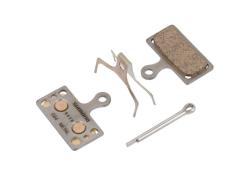Shimano D03S Resin
From 99,70

Shimano L03A
From 111,10

Shimano G04S
From 75,50

Shimano D03S Resin vs. Shimano L03A vs. Shimano G04S



This is what our customers think
Reviews
Pros
-
Good price (5x) |
Available! (5x) |
In stock (2x) |
Quiet (2x) |
Work well (2x) |
Excellent brake pads |
Do not wear out so fast |
Brand warranty |
Cons
-
None (11x) |
expensive (2x) |
Pricey (2x) |
More expensive than third party pads |
None (3x) |
Slightly less braking power than with resin blocks |
Less direct than resin blocks |
More expensive than resin blocks |
According to the product specialist
Pros
| These brake pads grip quickly. |
| The controllability of these brake pads is very good. |
| These pads make little noise when cycling. |
| Heat dissipation is improved thanks to the cooling fins. |
| These organic brake pads produce very little noise. |
| These brake pads respond quickly and are easy to modulate. |
| These brake pads are very resistant to heat generated by long descents. |
| These brake pads are very wear resistant. |
Cons
| These brake pads 'fade' sooner than brake pads with a harder compound. |
| The durability of these pads is not as good as with harder pads. |
| Although heat dissipation is improved due to the cooling fins, these resin brake pads are more sensitive to heat than brake pads with a (semi-)metallic compound. |
| Sintered brake pads have a slower engagement than organic brake pads. |
Specifications
Bike Type
Mountain bike
Road bike
Gravel bike
Gravel bike
Mountain bike
Road bike
Gravel bike
Road bike
Gravel bike
Soft (Resin/Organic)
Soft (Resin/Organic)
Hard (Metal)
Number of brake pads
1 Pair
2 Pairs
2 Pairs
1 Pair
2 Pairs
2 Pairs
1 Pair
2 Pairs
2 Pairs
Shimano B
Shimano G
Shimano A
 Nederland
Nederland België
België Deutschland
Deutschland United Kingdom
United Kingdom Finland
Finland Ireland
Ireland Luxembourg
Luxembourg Portugal
Portugal Poland
Poland Österreich
Österreich France
France España
España Italia
Italia Sverige
Sverige Danmark
Danmark









































































































































































































































